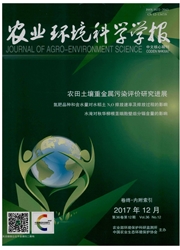

 中文摘要:
中文摘要:
采用光照培养箱培养斜生栅藻的方法,以甘油为溶剂,研究了三聚氰胺对斜生栅藻的毒性效应。结果显示,当三聚氰胺的浓度在50、200 mg.L-1时,对斜生栅藻生长有促进作用,在750 mg.L-1时则表现出抑制效应,染毒7 d后对叶绿素的影响和对藻密度的影响一致,显示浓度-效应关系,即浓度越高抑制效应越明显。三聚氰胺对斜生栅藻超氧化物歧化酶(SOD)的影响表现为:当三聚氰胺浓度为200 mg.L-1时酶的活性达到峰值,然后开始下降,在750 mg.L-1 SOD的活性与对照相比减少了43.6%,三聚氰胺对斜生栅藻的脂质过氧化产物丙二醛(MDA)的影响和对可溶性糖的影响效应是一致的,随着浓度的增加均在减少。
 英文摘要:
英文摘要:
Due to high prevalence of epidemic cases of renal failure among Chinese infants in 2008, resulting from of melamine contaminated milk, raised concerns about food safety and also the international interest to studying the melamine toxicity mechanism was established. Melamine is an organic base and a trimer of cyanamide, with a 1,3,5-triazine skeleton or simply, its an azocyclo-containing organic compound, and traditionally used in the chemical and sporadically mixed into animal feeds to boost protein content. Animal feeding with excessive melamine concentration can induce renal failure and even death. The residue of melamine in edible animal products also threatens human health. Melamine is used as food additives which has a ranther poor biodegradability. The possibility of water resources and soils being contaminated by melamine discharge arouse more and more concern. This study was designed to test the melamine toxicity effects on aquatic ecosystem. S. obliquus was exposed to series melamine concentrations(0, 50, 200, 750 mg·L^-1 ). Five parameters were measured after 7 days exposure, which were growth rate, superoxide dismutase (SOD), photosynthetic pigments, free malondialdehyde (MDA) and soluble sugar contents. Melamine concentration of 50, 200 mg·L^-1 caused a significant increase in growth and photosynthetic pigments contents. SOD activities of S. obliquus were stimulated first and then inhibited with the increasing of melamine concentrations, and reached its peak in 200 mg·L^-1 (con:pared with the control, P〈0.05 ) reduced by 43.6% in 750 mg. L-I ( compared with the control). The contents of MDA and soluble sugar were inhibited significantly under moderate and high concentration ( 50, 200, 750 mg·L^-1 ) of melamine.This study indicated that, SOD was sensitive to melamine exposure and could be used as a potential biomarker for risk assessment of aquatic ecosystem safety.
 同期刊论文项目
同期刊论文项目
 同项目期刊论文
同项目期刊论文
 Understanding the Spectroscopic Properties of the Photosynthetic Reaction Center of Rhodobacter spha
Understanding the Spectroscopic Properties of the Photosynthetic Reaction Center of Rhodobacter spha Expression and homology modeling of sterol 14α-demethylase of Magnaporthe grisea and its interaction
Expression and homology modeling of sterol 14α-demethylase of Magnaporthe grisea and its interaction Structure-based Rational Quest for Potential Novel Inhibitors of Human HMG-CoA Reductase by Combinin
Structure-based Rational Quest for Potential Novel Inhibitors of Human HMG-CoA Reductase by Combinin Interactions of Ligands with Class-II HMG-CoA Reductase of Streptococcus Pneumoniae by Homology Mode
Interactions of Ligands with Class-II HMG-CoA Reductase of Streptococcus Pneumoniae by Homology Mode Biodegradation of p-nitrophenol by Pseudomonas aeruginosa HS-D38 and analysis of metabolites with HP
Biodegradation of p-nitrophenol by Pseudomonas aeruginosa HS-D38 and analysis of metabolites with HP Expression, Purification, Characteristics and Homology Modeling of the HMGS from Streptococcus pneum
Expression, Purification, Characteristics and Homology Modeling of the HMGS from Streptococcus pneum Optimised expression and spectral analysis of the target enzyme CYP51 from Penicillium digitatum wit
Optimised expression and spectral analysis of the target enzyme CYP51 from Penicillium digitatum wit 期刊信息
期刊信息
